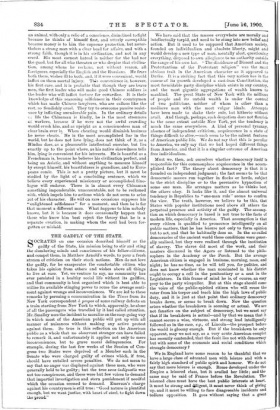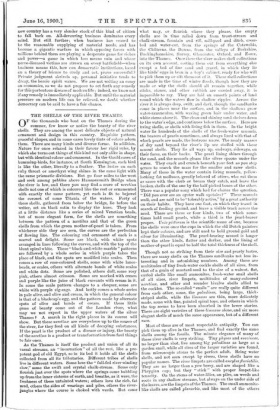THE GADFLY OF THE STATE. OCRATES on one occasion described
himself as the gadfly of the State, his mission being to stir and sting the slumbering minds and consciences of his fellow-citizens, and compel them, in Matthew Arnold's words, to pour a fresh stream of criticism on their stock notions. Men do not love the gadfly, for he exasperates the comfortable citizen who takes his opinion from others and wishes above all things to live at ease. Yet, we venture to say, no community has ever persisted in a healthy social life without its gadflies, and that community is best organised which is best able to utilise its available stinging power to rouse the average senti- ment against wrongs and inconveniences. We are led to these remarks by perusing a communication in the Times from its New York correspondent a propos of some railway defects on a train starting from New York to which, apparently, he alone of all the passengers who travelled by it had called attention. Mr. Smalley uses the incident to moralise on the easy-going way in which most of the American public will put up with all manner of nuisances without making any active protest against them. So true is this reflection on the American public as a whole that no observant stranger can have failed to remark it, and unfortunately it applies not only to mere inconveniences, but to grave moral delinquencies. For example, during the last few weeks of the Session of Con- gress two States were deprived of a Member each in the Senate who were charged guilty of crimes which, if true, should have entailed severe penalties. We do not mean to say that no anger was displayed against these men, who were generally held to be guilty; but the true sava inclignatio was not too conspicuous, and there were but few voices to demand that impartial investigation and stern punishment if needful which the occasion seemed to demand. Emerson's charge against his countrymen is still true: "Good nature is plentiful enough, but we want justice, with heart of steel, to fight down the proud,"
We have said that the masses everywheie are morally and intellectually torpid, and need to be stung into new belief and action. But it used to be supposed that American society, founded on individualism and absolute liberty, might and would develop a new type of man, mentally alert, questioning
everything, disposed to own allegiance to no authority outside the range of his own hat. "The dissidence of Dissent and the Protestantism of the Protestant religion" was the most obvious trait in the American character as it appeared to Burke. It is a striking fact that this very nation has in the course of its growth developed a cast-iron Constitution, the most formidable party discipline which exists in any country, and the most gigantic aggregations of wealth known to mankind. The great State of New York with its millions of people and its untold wealth is under the control of two politicians, neither of whom is other than a mediocre man with the most vulgar ideals. Attempts have been made to shake their rule, but hitherto without avail. And though, perhaps, such despotism does not flourish to the same extent outside New York, yet the tendency is much the same everywhere. A, kind of personal tyranny, absence of independent criticism, acquiescence in a state of things difficult to alter,—such seem to be the salient features of American public life. We do not say that this is peculiar to America, we only say that we had hoped different things from America, and that it is a singular outcome of American free individualism.
Must we, then, ask ourselves whether democracy itself is responsible for this commonplace acquiescence in the accom- plished fact? The theory about democracy is that it is founded on independent judgment; the fact seems to be that democratic masses run together in flocks or herds, subject to the strict discipline or to the persuasive hypnotism of some one man. He arranges matters as he thinks best, the others obey. It looks like it, and the almost universal tendency in Republics to "one-man rule" seems to confirm the view. The truth, however, we believe to be this, that States with popular institutions need above all others the perpetual presence and activity of the gadfly. The assump- tion on which democracy is based is not true to the facts of modern life, especially in America. That assumption is that every citizen is qualified to pronounce intelligently on all public matters, that he has leisure not only to form opinion but to act, and that he habitually does so. In the so-called democracies of the ancient world these conditions were gener- ally realised, but they were realised through the institution of slavery. The slaves did most of the work, and their masters discussed in the Agora or listened to the philo- sophers in the Academy or the Porch. But the average American citizen is engaged in business, morning, noon, and night; he has no time, as he will tell you, for politics, and does not know whether the man nominated in his district ought to occupy a cell in the penitentiary or a seat in the Legislature. In this frame of mind he is, of course, an easy prey to the party wirepuller. But at this stage should come the voice of the public-spirited citizen who will rouse the voter from his torpor and teach him the high laws of public duty, and it is just at that point that ordinary democracy breaks down, or seems to break down. Now the question arises whether the breakdown is seeming or actual. We are not fanatics on the subject of democracy, but we must say that if its breakdown is actual—and by that we mean that it cannot secure a wise, virtuous, and strong lead intelligently followed as in the case, e.g., of Lincoln—the prospect before the world is gloomy enough. But if the breakdown be only apparent, may we not say, as a very acute American essayist has recently contended, that the fault lies not with democracy but with some of the economic and social conditions which strangle democracy ?
We in England have some reason to be thankful that we have a large class of educated men with leisure and with a fairly high standard of public spirit and honour. We do not say that mere leisure is enough. Rome developed under the Empire a leisured class, but it availed her little; and the same may be said of France before the Revolution. The leisured class must have the best public interests at heart, it must be strong and 4iligent, it must never think of giving up, and it must be willing to face disagreeable incidents and tedious opposition. It goes without saying that a great
new country has a very slender stock of this kind of citizen to fall back on. All-devouring business dominates every mind. But still further; when business has ceased to be the reasonable supplying of material needs, and has become a gigantic warfare in which opposing forces with millions behind them are playing a desperate game for riches and power—a game in which loss means ruin and whose nerve-diseased victims are strewn on every battlefield—when business means this, how can democratic institutions, based on a theory of leisure to study and act, prove successful ? Private judgment shrivels up, personal initiative tends to decay, the heroic spirit wanes. We are not writing an essay on economics, so we do not propose to set forth any remedy for this portentous disease of modern life; indeed, we know not if any remedy is immediately applicable. But until the material pressure on modern life can be relieved, we doubt whether democracy can be said to have a fair chance.







































 Previous page
Previous page